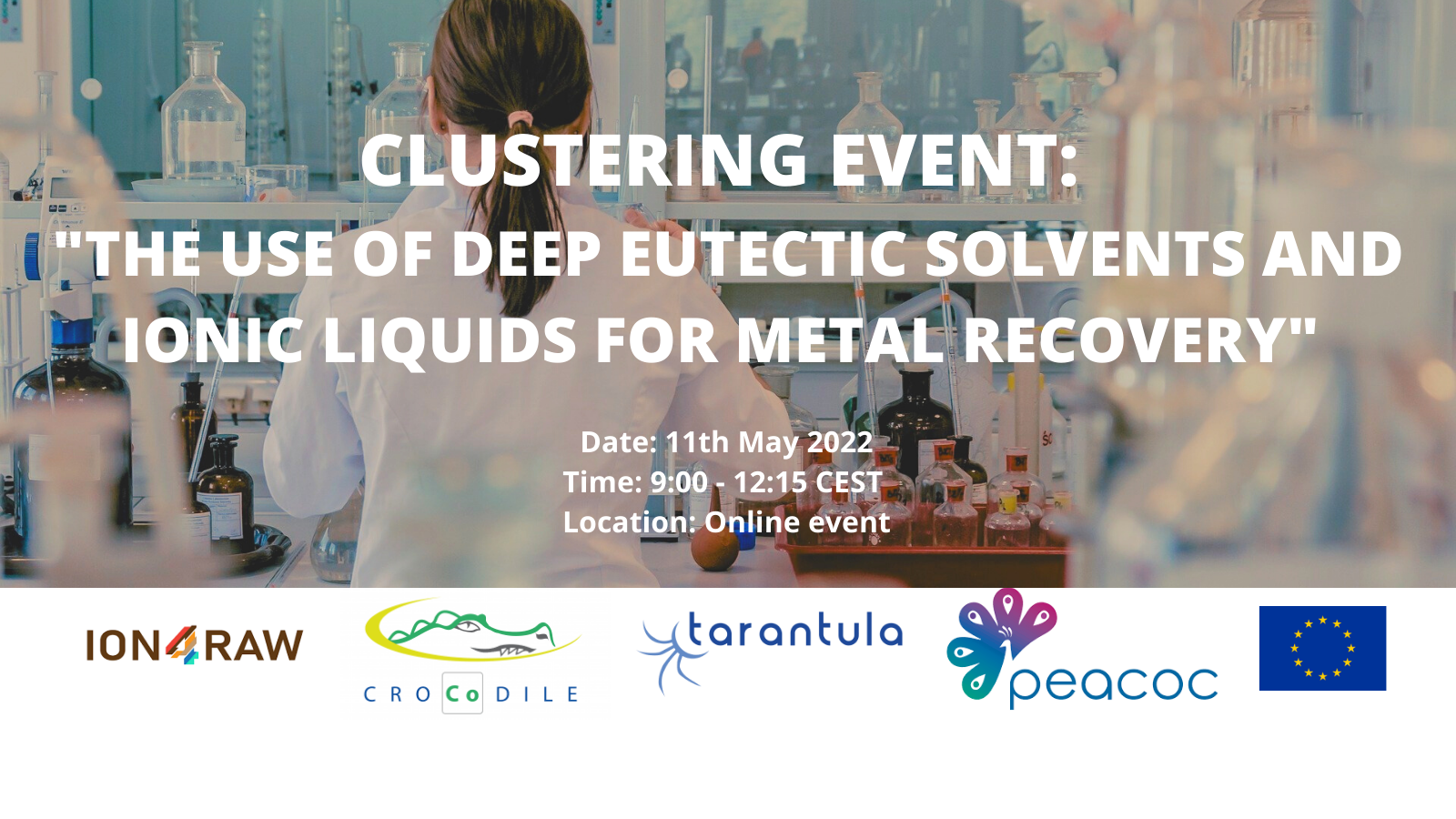How is Research and Development supporting Europe’s leadership in metal recovery?
On Wednesday, 11 May 2022, four Horizon 2020 projects – PEACOC, ION4RAW, CROCODILE and TARANTULA, co-organised the clustering workshop “The use of ionic liquids (IL) and Deep Eutectic Solvents (DES) for metal recovery’’. The event highlighted the latest Research and Development (R&D) results and experts discussed the challenges and opportunities for the recycling and recovery of technologically critical and valuable metals with the use of ionic liquids (IL) and deep eutectic solvents (DES).
In times questioned by climate change and resource depletion, Europe is shifting efforts towards greener alternative technologies. Today, there is a higher demand for non-fossil fuel-based technologies, such as electric vehicles, fuel cells, or batteries, which require extensive use of highly valued metals – precious metals, rare earth metals, battery components, among others.
In order to mitigate resource vulnerability, the European Commission wants to secure the supply of these materials by promoting EU-based mining and the recycling of critical raw materials (read more in the European Raw Materials Alliance). For this reason, the European Union is supporting initiatives to secure the supply of critical materials through recycling. Among the different chemical alternatives proposed, the application of IL and DES stands out in the chemical process applied within the recovery and recycling of critical materials.
IL and DES can replace the usually toxic and flammable organic solvents reduce chemical waste and improve the safety of chemical processes and products[1]. Moreover, they may offer potential as an environmentally sustainable alternative to conventional separation processes – involving the use of aqueous acids or organic solvents – in particular due to their characteristics: low volatility, high thermal stability, low vapor pressure etc.
During the event, experts from the European research community working on EU-funded projects demonstrated their latest innovations in the field of critical materials recycling, and debated technical and economic opportunities.
Dr. Javier Nieto (TECNALIA) introduced the goal of the TARANTULA project. He stressed the importance of this project in order to develop an efficient and flexible set of metallurgical technologies with high selectivity and recovery of resources such as Tungsten (W), Niobium (Nb) and Tantalum (Ta), occurring as by-products in mining and processing waste streams.
The PEACOC project, was also presented during the event. Elisabet Andrés (TECNALIA) explained how the project is currently working on the use of deep eutectic solvents for the recovery of Platinum Group Metals (PGMs), Silver (Ag) and Gold (Au).
The vision of the industry was represented by Solvionic, IoLiTec and Ionix. They stressed the importance of IL and DES as essential elements in today’s industrial production towards a sustainable economy by using them in the applications for batteries, fuel cells, industrial electrolysis, and other technologies. The advantages of using IL and DESs in metal recovery are multiple. However, experts from the industry and research community concluded that to bring these technologies to mainstream and upscaled industrial conditions, it is still necessary to overcome some challenges. Europe needs to continue investing in research and innovation to diversify its leadership and increase its competitiveness.
The workshop in figures
According to the post-event statistics, the attendance report counted more than 65 participants, equally distributed between academia (53%) and industry representatives (41%), mainly located in Europe.
The Q&A session allowed all participants to engage in discussions around the complexity of technological and chemical processes, and further debate the scale-up and cost-reduction opportunities.
Presentations
Welcome and introduction, Laura Borge del Rey, PNO
ION4RAW project, Maria Tripiana, IDENER
CROCODRILE project, Jokin Hidalgo, Tecnalia
TARANTULA project, Dr. Javier Nieto, Tecnalia
PEACOC project, Dr. Elisabet Andres, Tecnalia
The case of Solvionic, Dr. Sebastien Fantini, Solvionic
The case of IOLITEC, Dr. Sebastian Plebst, IOLITEC
The case of FFI Ionix, Bamdad Bahar, FFI Ionix
[1] Freemantle, M. (2010). An introduction to ionic liquids. Royal Society of chemistry

 This
project has received funding from the European Union’s
Horizon 2020 research and innovation programme under grant
agreement No 958302.
This
project has received funding from the European Union’s
Horizon 2020 research and innovation programme under grant
agreement No 958302.